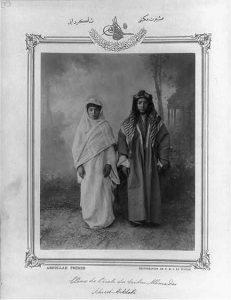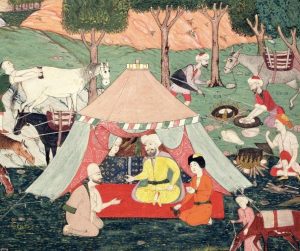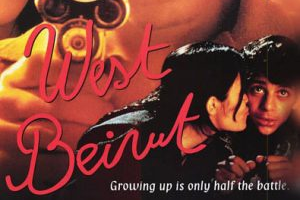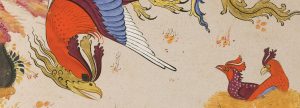
The annual “Identities in the Middle East Workshop,” organized and hosted by the Institute
of Near Eastern and African Studies at Charles University, will be inaugurated with a twoday
deliberation on late-Ottoman identities. The aim of the workshop is for participants to
gain a profound awareness of the conceptualizations and manifestations of individual,
communal, national, and transnational identities in the last century of the Ottoman Empire.
Participants are expected to actively engage in discussions generated by a set of common
readings.
Dates & Venue: 12–13 October 2018, Prague, Czech Republic
Content of the Workshop:
The first day of the workshop, chaired by Hasan Kayalı, will open with theoretical
considerations of identity and belonging and case studies that reveal particular complexities
of identity among peoples of the late Empire. The second day’s sessions will consider
alternative perspectives and will be divided between a session on transnational identities,
chaired by Ebru Akcasu, and marginal identities, chaired by Stefano Taglia. The transnational
session will evaluate notions of belonging to the Ottoman state from the perspective of
foreigners, both Ottomans abroad and non-Ottomans within the dominions. The session on
marginals will analyze the relationship between the state and groups engaged in nonconformal
behaviors, such as drug addicts, prostitutes, and alcohol drinkers, to reflect on
the state’s role as service provider and its expectations of individuals as modern citizens.
The workshop will conclude by carrying the conversation about identity into the post-
Ottoman era and will assess the balance sheet of the (active) dissolution of multi-faceted
Ottoman identities in the states that emerged from Ottoman territories. The closing session
will be chaired by Hasan Kayalı.
Eligibility and Application:
This workshop is designed for doctoral students and early-career academics (i.e., those who
have received their degrees within the last 5 years). To apply, please email your curriculum
vitae and a 500-word statement of how this workshop is relevant and useful to your current
research to: katarina.palcova@ff.cuni.cz
The subject line of the email should clearly indicate that it is an application for the “Late-
Ottoman Identities Workshop.”
The deadline for applications is 7 July 2018. Successful candidates will be notified by 20 July
2018.
Funding may be provided for applicants whose home institutions do not cover travel and/or
accommodation expenses. Please indicate in the application whether this applies to you.
Requests will be evaluated on a case-by-case basis.
Workshop Schedule:
Friday, 12th October, 2018 (Faculty of Arts, Charles University)
Chair: Hasan Kayalı
10:00 – 13:00 Identity and belonging in the late Ottoman Empire
13:00 – 14:30 Lunch break
14:30 – 17:30 Case studies
Saturday, 13th October, 2018 (Faculty of Arts, Charles University)
Chair: Ebru Akcasu (morning session) & Stefano Taglia (afternoon session)
10:00 – 13:00 Transnational identities in the late Ottoman Empire
13:00 – 14:30 Lunch break
14:30 – 17:30 Marginals as citizens in the late Ottoman Empire
18:00 – 18:30 Closing Remarks chaired by Hasan Kayalı

‘Sultans as Saviors: Early Modern Mediterranean Jewish Accounts of the Ottoman Rulers’
Professor Marc David Baer, London School of Economics and Political Science
Messianic impulses lie at the core of early modern Mediterranean Jewish accounts of the Ottoman sultans. Jews’ affective disposition compelled them to be grateful to the rulers of the kingdom that allowed them to live as Jews, shaping a utopian image of the Islamic rulers. In the fifteenth and sixteenth centuries, Jews focus on the Ottoman sultan, who personifies the empire, depicting him in messianic terms as the one who fulfils God’s plan in the world by punishing the Jews’ Christian oppressors (Byzantine and Catholic). They also credit him for ingathering the Jewish exiles from newly Christian Spain, conquering Jerusalem, and allowing Jews to settle in the Holy Land. In their view, all serve as portents of the dawning of the messianic age. In seventeenth century accounts, the Ottoman savior is replaced by a Jewish one, the messianic claimant Shabbatai Tzevi. However, modern historiography has retained the main claims of these early modern accounts.

Katedra Blízkého východu zve na projekci filmu West Beirut (1998) s následnou diskuzí!
This French-Lebanese-Belgian co-production is an autobiographical drama. In 1975 after Tarek and Omar witness the start of civil war, they are picked up by Tarek’s mother Hala. Hala wants to flee, but her husband won’t allow it. Tarek and Omar wander about, but the realities of war soon intrude.
Datum a čas: 25. 10. 2018 v 17:45
Místo: C238, Celetná 20, Praha 1
Moderátoři: Stefano Taglia (OÚ AV ČR) a Karolína Lahučká (KBV FF UK)
Katedra Blízkého východu zve na projekci filmu Divorce Iranian Style s následnou diskuzí!
Divorce Iranian Style is a 1998 documentary film directed by Kim Longinotto and Ziba Mir-Hosseini which chronicles the legal battles of three Iranian couples as they go through the various legal processes and cultural barriers seeking to file for divorce and highlights the poignant differences of men and women in the court system.
Datum a čas: 22. 11. 2018 v 17:45
Místo: C238, Celetná 20, Praha 1
Moderátoři: Stefano Taglia (OÚ AV ČR) a Karolína Lahučká (KBV FF UK)
Gendering Authoritarianism & Resistance: The Significance of Body Politics in the Middle East
Nadje Al-Ali
Nadje Al-Ali is Professor of Gender Studies at the Centre for Gender Studies (CGS), SOAS University of London. She is currently chair of the Centre for Gender Studies but will leave SOAS to take up a new position in anthropology with reference to the Middle East at Brown University in January. Her main research interests revolve around feminist activism and gendered mobilization, mainly with reference to Iraq, Egypt, Turkey and the Kurdish political movement, and most recently Lebanon. Her publications include What kind of Liberation? Women and the Occupation of Iraq (2009, University of California Press, co-authored with Nicola Pratt); Women and War in the Middle East: Transnational Perspectives (Zed Books, 2009, co-edited with Nicola Pratt); Iraqi Women: Untold Stories from 1948 to the Present (2007, Zed Books Secularism, Gender and the State in the Middle East (Cambridge University Press 2000) as well as numerous book chapters and journal articles. Her co-edited book with Deborah al-Najjar entitled We are Iraqis: Aesthetics & Politics in a Time of War (Syracuse University Press) won the 2014 Arab-American book prize for non-fiction. Her more recent research and publications focus on the Turkish-Kurdish conflict and the Kurdish women’s movement and queer feminist activism in Beirut.
She has been a member of the Feminist Review Collective, and is on the editorial board of Kohl: a journal of body and gender research. As a feminist activist she has been involved in various local and transnational organizations and campaigns and was a founding member of Act Together: Women’s Action for Iraq.
Katedra Blízkého východu Vás zve na přednášku:
Teheran Duo: Contemporary Iranian Literature
Two Iranian authors, Bita Malakuti and Raziyeh Ansari, will discuss their literary work and read short excerpts from their prose and poetry in Persian, Czech and English.
Date and Time: Thursday, 6 December 2018, 17:30
Location: Faculty of Arts, Charles Unviersity, Room 238, Celetná 20, 116, Staré Město
Organised by: Zuzana Kříhová and Mona Khademi, Department of Middle Eastern Studies, Charles University
About authors:
Bita Malakuti was born in Tehran. She started taking writing seriously by the age of 20 and poems and short stories were getting published in different magazines before she 25. So far she has published seven books, including three collections of short stories, two poetry, one novella and one reference book on the professional life of the renowned Iranian actress Soosan Taslimi. She left Iran for the United States in 2006 and now she is living in Prague, Czech Republic. Some of her poems have been translated and published in other languages such as English, French, Turkish, Kurdish, Swedish, Czech, Arabic, Nepali and Spanish.
Razieh Ansari studied linguistics and German studies in Iran. She cooperated with many Iranian periodics, eg. Negah-e now, Bahar, Sharq, Hamshahri.. At her literary work, she focuses at interaction between tradition an modernity and her prosaic works have won her national as well as international recognition. Her first novel, Like A Scent in the Breeze, was awarded the Iranian Literary Prize in 2012. Her subsequent novels, Tehran Trio and A Woman with a Pearl Brooch, were both received with critical acclaim. Raziyeh Ansari lives currently at Prague.

For they cannot speak: Two Early examples of animal protection laws in the Islamic world
The legal protection of animals in the pre-modern Islamic world is a largely understudied topic among students of the Middle East. Idealized depictions of the interaction of humans with animals in the prescriptive religious texts of Orthodox Islam as well as in the writings of Islamic mystics do not allow for an adequate assessment of how animals were treated by people in different realms and periods of Islamic history.
This talk will offer a glimpse at the legal protection afforded to beasts of burden on the local level in two Ottoman cities on the basis of regional law codes (kanunnames). Two easily overlooked passages in Ottoman law codes from Anatolia at the beginning of the 16th century contain legal stipulations with regard to beasts of burden, which, as will be argued in this paper, present the earliest known codification of animal rights in the Ottoman context. More importantly, while regulating the protection of the rights of animals only for a very specific context, a close look at the legal stipulations reveals a surprisingly modern and “progressive“ sounding justification of the need of animals to receive protection from the abuse by humans. Is it possible that views held by animal rights activists of the 20th century and by a handful of Western philosophers since the 17th century in favor of a pathocentric approach to animal rights were already anticipated in an Ottoman legal code of the 16th century?
By contrasting the stipulations of the kanunnames to the views on animal rights expressed in Islamic doctrine, Sufi treatises, hisba texts and travelogues from the Ottoman period, this paper will call into question for Ottoman Anatolia of the early 16th century the predominant view on animal protection held for the pre-modern Islamic world (and beyond) from a merely anthropocentric perspective.
Bio
Richard Wittmann (Ph.D. in History and Middle Eastern Studies, Harvard University 2008) is the Associate Director of the Orient-Institut Istanbul, a German humanities research institute abroad. The Istanbul based member institute of the Max Weber Foundation is dedicated to the promotion of academic research on Turkey and its neighboring countries of the Balkans and the Near East. After studying Law, Islamic Studies, and Turcology at the University of Munich and at Freie Universität Berlin he was awarded a scholarship from Harvard University where he continued his studies at the Department of History and at the Center for Middle Eastern Studies.
His research interests focus on Islamic legal history and the social history of the Ottoman Empire. Special attention is given in his work to the consideration of self-narratives as historic sources for the study of the Near East. Richard Wittmann coordinates an international collaborative research project aiming at the study and publication of Ottoman self-narratives (www.istanbulmemories.org). He is the editor of the publication series Memoria. Fontes Minores ad Historiam Imperii Ottomanici Pertinentes (www.perspectivia.net/publikationen/memoria) and coeditor of the monograph series Life Narratives of the Ottoman Realm: Individual and Empire in the Near East (https://www.routledge.com/Life-Narratives-of-the-Ottoman-Realm-Individual-and-Empire-in-the-Near-East/book-series/LNOR).
His latest coedited volume Istanbul – Kushta – Constantinople. Narratives of Identity in the Ottoman Capital, 1830-1930 (Routledge) was released in September 2018.
Katedra Blízkého východu zve na projekci filmu Crossing the Bridge: The Sound of Istanbul s následnou diskuzí!
Award-winning director Fatih Akin takes us on a journey through Istanbul, the city that bridges Europe and Asia, and challenges familiar notions of east and west. He looks at the vibrant musical scene which includes traditional Turkish music plus rock and hip-hop.
Datum a čas: 20. 12. 2018 v 17:45
Místo: C238, Celetná 20, Praha 1
Moderátoři: Stefano Taglia (OÚ AV ČR) a Karolína Lahučká (KBV FF UK)
Nakladatelství Academia Vás srdečně zve na slavnostní uvedení a prezentaci knihy Jitky Malečkové a Petra Kučery Z Istanbulu až na konec světa: Osmanské cestopisy z přelomu 19. a 20. století.
Datum a čas: Úterý 19. února 2019 v 18:00
Místo: Literární kavárna Academia (Václavské nám. 34, Praha 1)
Katedra Blízkého východu Vás zve na přednášku „Fatma al-Ma’amari – Ambassador of Omani Language and Culture“ ve čtvrtek, 7. března 2019, v 17:45 v místnosti 238.
Je to vaše příležitost objevit Omán, být mezi Ománci, přiblížit se k ománským zvykům a tradicím, ochutnat ománskou kávu a vychutnat si vůni ománského kadidla.
Zajímá vás perská kultura? Chtěli byste se dozvědět něco více o Nourúzu, nejvýznamnějším perském svátku, který se slaví nejen v Íránu, ale i Afghánistánu, Tádžikistánu, Ázerbájdžánu a dalších zemích?
Přijďte s námi oslavit perský Nový rok:
• tradičním perským a arménským tancem (taneční skupina Šírín)
• povídáním o tradicích a zvycích, které se pojí s Nourúzem
• promítáním íránského filmu
• a možná i občerstvením!
Akce se koná v Studentském klubu Celetná, Celetná 20, Praha 1, ve středu 20. března, od 18 hod
Pořádá Katedra Blízkého východu, vstupné dobrovolné
Authorizing feminist readings of Islamic history: Zaynab Fawwaz and the gender politics of Egyptian public discourse in the fin-de-siècle
Lebanese-Egyptian Zaynab Fawwaz (c1850-1914) was an unusual presence in 1890s Egyptian discourse: a largely self-taught immigrant from Shiʿi south Lebanon, a woman who wrote and published without major family support, a forthright voice on women’s needs as distinct from ‘the nation’s’. Like most Arabophone writers on ‘the woman question’, Fawwaz addressed girls’ education, but she focused less on domestic training and more on work and income, gender-defined dependency and exploitation, and the uses of religious knowledge. She addressed the relationship between female mobility and feminine intellectual self-realisation. Framing her arguments within terms of engagement defined by Islamic shariʿa, she appropriated keywords to redefine them for an indigenous feminism. She repurposed the premodern Islamic-Arabic genre of biographical writing for feminist-inflected history writing. I consider how Fawwaz deployed terminology and genre to contest patriarchal readings of Islamic practice sustained by assumptions of masculinist authority. Fawwaz’s writings remind us that secularism was never inherent in Arabophone feminist theorizing, nor were the earliest Arab feminisms Western derivatives. Particular historical assemblages and perspectives shaped by Islamic (and Christian) worldviews yielded creative syntheses that were firmly indigenous.
Madžlis a Katedra Blízkého východu FF UK Vás srdečně zvou na již tradiční promítání filmu ve spolupráci s čítárnou Unijazz. Byť je prostor v Jindřišské nyní uzavřen, kolektiv stále funguje, a to v prostorách kavárny Únik, kde se uskuteční i tato akce.
Tenktokrát Madžlis s KBV promítnou film MUSTANG z tureckého prostředí režisérky Deniz Gamze Ergüven, která za svůj debut získala nominaci na oscara za nejlepší zahraniční film. Ústředním motivem Mustanga jsou ženy. Pět sester snažící se rozbít okovy konzervativního tureckého venkova, revoltující proti tradičním hodnotám své rodiny, hledající vlastní identitu a cestu ke svobodě. Mustang jakožto divoký kůň symbolizuje právě jejich vzdor.
Film bude doprovázet komentář turkoložky a překladatelky Petry Sedmíkové, která mimo jiné vytvořila české titulky k filmu.
VSTUP JE ZDARMA